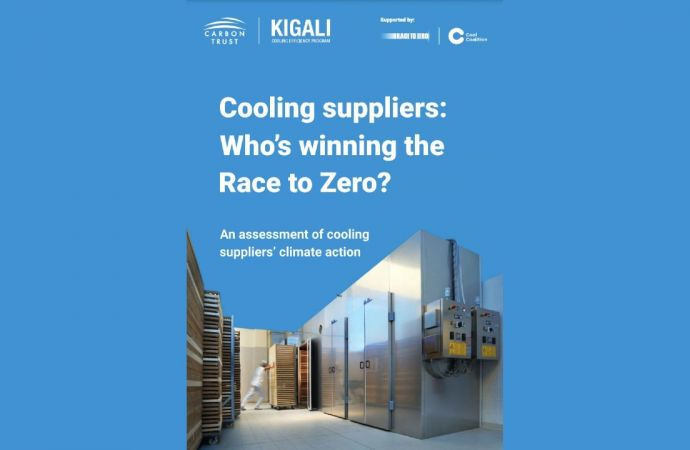Technology using hydrocarbons is a highly interesting but also still poorly understood option to replace HCFCs in developing countries, reactions at an international Montreal Protocol meeting in Bangkok showed. A comprehensive report now updates on projects and organizations promoting natural refrigerants at this key event.

“Until recently, the voice of the fluorocarbon industry has been heard much more loudly and forcefully within the Montreal process than the voice of those calling for genuinely sustainable solutions. As a result, many of the parties and participants are simply unaware of the potential of natural refrigerants, and the tangible results being achieved on the ground,” Brent Hoare from the Green Cooling Council outlined reactions among participants of the 28th Working Group meeting of Montreal Protocol Parties held in Bangkok on 7-11 July.
The quote, taken from a summary report about major side events and presentations in Bangkok focusing on natural refrigerants, thus insists that still more communication is needed to convince decision makers in developing countries of the substantial benefits that using hydrocarbons (HC) and other natural refrigerants in next-generation refrigeration will hold for them. Like the Green Cooling Council, a record number of non-governmental organizations, including Greenpeace and the Environmental Investigation Agency (EIA), gathered in Bangkok to also warn participants that switching from ozone-depleting substances to high global warming HFCs could counteract already achieved progress in climate protection. Presenting real-life examples of energy-efficient HC installations was therefore the best way to avoid a prolonged use of fluorocarbons justified by its proponents on the basis of higher energy efficiency claims.
Hydrocarbons: up to 20% energy savings
To prove that HC-based air conditioning and refrigeration is already working successfully in stationary and mobile applications, the Green Cooling Council presented facts about latest developments in Australia. Hydrocarbons are gaining momentum as an ideal solution for small domestic and commercial split system air conditioning, where up to 20% of electricity can be saved. The market for HCs is beginning to grow with new actors joining the market. However, the Green Cooling Council urged all major suppliers to reinforce their efforts and follow early adopters addressing rapidly rising greenhouse gas emissions.
Over 18 million car users use hydrocarbon refrigerant in their air conditioning system. At the end of 2002, the number of motor vehicles using hydrocarbon refrigerant had reached 5 million across the USA and Australia. Other mobile applications could include trucks and buses, transport refrigeration, off-road farming equipment and mining equipment.
Montreal process: Priority given to minimum-impact alternatives
The NGO’s call for truly sustainable cooling options was supported by a major paper* acknowledging the significant contribution of the Montreal Protocol – originally meant to phase out ozone-depleting substances (ODS) – to a worldwide reduction of greenhouse gas emissions. The publication was followed by Montreal Decision XIX/6 which encouraged all countries “…to promote the selection of alternatives to HCFCs that minimize environmental impacts, in particular impacts on climate”. As a consequence, the Multi Lateral Fund (MLF) – the body funding particular projects to phase out ODS - must now give priority to projects and programmes focusing on “…alternatives that minimise other impacts on the environment including on the climate, taking into account global warming potential, energy use and other relevant factors”. These developments have put back the spotlight on projects involving natural refrigerants.
**Guus J. M. Velders, et. al., The importance of the Montreal Protocol in protecting climate, 104 PROCEEDINGS OF THE NATIONAL ACADEMY OF SCIENCES 4814 (2007). http://www.pnas.org/cgi/content/abstract/0610328104v1
The quote, taken from a summary report about major side events and presentations in Bangkok focusing on natural refrigerants, thus insists that still more communication is needed to convince decision makers in developing countries of the substantial benefits that using hydrocarbons (HC) and other natural refrigerants in next-generation refrigeration will hold for them. Like the Green Cooling Council, a record number of non-governmental organizations, including Greenpeace and the Environmental Investigation Agency (EIA), gathered in Bangkok to also warn participants that switching from ozone-depleting substances to high global warming HFCs could counteract already achieved progress in climate protection. Presenting real-life examples of energy-efficient HC installations was therefore the best way to avoid a prolonged use of fluorocarbons justified by its proponents on the basis of higher energy efficiency claims.
Hydrocarbons: up to 20% energy savings
To prove that HC-based air conditioning and refrigeration is already working successfully in stationary and mobile applications, the Green Cooling Council presented facts about latest developments in Australia. Hydrocarbons are gaining momentum as an ideal solution for small domestic and commercial split system air conditioning, where up to 20% of electricity can be saved. The market for HCs is beginning to grow with new actors joining the market. However, the Green Cooling Council urged all major suppliers to reinforce their efforts and follow early adopters addressing rapidly rising greenhouse gas emissions.
Over 18 million car users use hydrocarbon refrigerant in their air conditioning system. At the end of 2002, the number of motor vehicles using hydrocarbon refrigerant had reached 5 million across the USA and Australia. Other mobile applications could include trucks and buses, transport refrigeration, off-road farming equipment and mining equipment.
Montreal process: Priority given to minimum-impact alternatives
The NGO’s call for truly sustainable cooling options was supported by a major paper* acknowledging the significant contribution of the Montreal Protocol – originally meant to phase out ozone-depleting substances (ODS) – to a worldwide reduction of greenhouse gas emissions. The publication was followed by Montreal Decision XIX/6 which encouraged all countries “…to promote the selection of alternatives to HCFCs that minimize environmental impacts, in particular impacts on climate”. As a consequence, the Multi Lateral Fund (MLF) – the body funding particular projects to phase out ODS - must now give priority to projects and programmes focusing on “…alternatives that minimise other impacts on the environment including on the climate, taking into account global warming potential, energy use and other relevant factors”. These developments have put back the spotlight on projects involving natural refrigerants.
**Guus J. M. Velders, et. al., The importance of the Montreal Protocol in protecting climate, 104 PROCEEDINGS OF THE NATIONAL ACADEMY OF SCIENCES 4814 (2007). http://www.pnas.org/cgi/content/abstract/0610328104v1
MORE INFORMATION
Related stories




